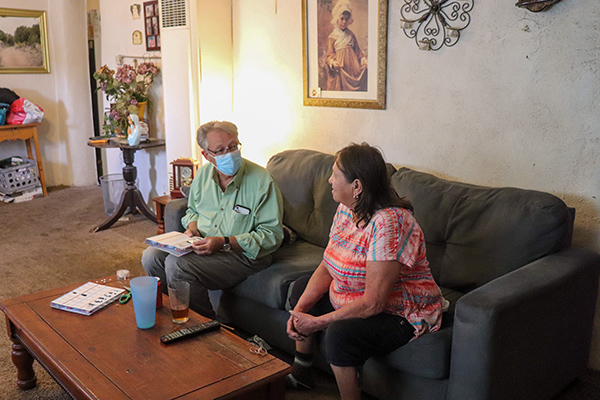Preparing for Disaster: UNM Hospital Participates in Region-Wide Emergency Training

Source of Support
UNM’s Assertive Community Treatment Team Aids People Living with Chronic Mental Illness
On a recent Tuesday, Jaime Campbell, a peer specialist with the Assertive Community Treatment (ACT) team, sorted a variety of fresh vegetables into eight separate grocery bags. She was preparing them for delivery as part of the home visits she and her team make each day.
ACT is a University of New Mexico Health System program that works with people living with chronic serious mental illness. It provides comprehensive services, including psychiatric care, nursing care, social work, psychotherapy, peer support and community resources support.
“I believe that ACT is the best service for our patients with chronic serious mental illness,” says Jonathan Bolton, MD, one of two psychiatrists on the team.

I believe that ACT is the best service for our patients with chronic serious mental illness
Bolton, a professor in the Department of Psychiatry & Behavioral Sciences and associate vice chancellor for Academic Affairs at UNM Health Sciences, has worked on the team for seven years.
“One thing that I think we do very well is to oppose the demoralization that can occur in people with serious mental illness,” he says. “We try to keep them hopeful and help them to assert as much control over their lives as possible.”
ACT is supported by a contract with the City of Albuquerque, and the team fans out throughout the city to meet patients at home and collaborate on working toward recovery goals, says Jacquie Anaya, a clinical manager for ACT.
“The goal is to keep people out of the hospital,” Campbell says.
Each day begins with a team meeting and each person is assigned six to eight people to visit per day. Campbell says that as a peer supporter she helps with appointments, taking people for walks, showing them how to cook and even creating music classes.
Sometimes the visit involves going on a walk or a trip to McDonald’s to work on paperwork.
The program is accepting donations for the people they support. Donations of gift cards to restaurants such as Subway or McDonald’s can be dropped off at the ACT office, 2301 Yale Blvd. SE, Suite F.
“We will go shopping with someone, if that's what they need,” Campbell says. Sometimes, the people they support just need someone to talk to, she adds.
The team also helps with daily living activities and organizes outings, such as trips to the zoo, to a swimming pool and to the movies.
The program, one of three in Albuquerque, accepts referrals from doctors and case managers. “We have a caseload of about 60 people,” Campbell says.
Because of its multidisciplinary structure, the team can administer medications in the home, she says.
“We are a long-term program,” Campbell says. “So once somebody is accepted, they're pretty much here until they decide they don't want to be, or until they need higher level of care that we can't provide. We've got people who've been on the team for 15 years.”
The program, which began about 15 years ago, helps people 18 years and older, Campbell says. “They have to be willing to accept the help and they have to be willing to participate with all of us.”
Campbell recently paid a visit to Theresa Lujan at her in the South Valley. Bolton also stopped by to discuss Lujan’s medications.
Campbell and Lujan decided to make calabacitas with the fresh veggies Campbell brought along. A donor buys fresh veggies a couple of times a month so that the ACT team can distribute them to the people they support, Campbell says. Recently, the veggie bags were filled with green onions, red potatoes, oranges, tomatoes, limes, an avocado, cherries and bunches of carrots.
“She’s a lot of support for me,” Lujan says. “I appreciate her coming and helping me. She cooks with me, we watch TV together, we do things together.”
Since ACT staff have been visiting her, life has improved, Lujan says. “I recommend everyone who needs a peer to get help. You can’t do it on your own. You do need to seek help. I’ve come a really long way to get well. This time it’s really happening. It’s like a miracle.”